Edie Melson's Blog, page 25
February 5, 2025
The Value of a Writing Retreat

by Lynn H. Blackburn @LynnHBlackburn
Ten years ago, in 2015, I went on my first-ever solo writing retreat. (You can read about it here, Is a Writing Retreat Right for You! )
My first book hadn’t come out yet, my children were still very young, and taking time away to write was still a novel concept.
Fast forward to 2025 and how things have changed! My children are significantly more self-sufficient, my writing career has grown in ways I never dared to dream, and taking time away to write has gone from being a rare treat to a crucial part of my process.
And y’all, the writing retreat I just returned from was so different from that first night away, mainly because I’ve learned what works and doesn’t, and I have a solid handle on what I need to make a writing retreat successful.
If you’re facing a deadline or want to see what might happen if you concentrated on your writing for a few days, allow me to make a few suggestions for a successful writing retreat.
Consider These Questions when Deciding on a Writing Retreat:
1. Words or Ideas?
Are you on a deadline? Do you need words? Or are you working on a proposal, and the need is for time and space for creativity to blossom? Are you in mid-project and need to dedicate a few days to falling in love with the story again? Or maybe you know what the story is about, but if you can’t take the time to research, you’ll never write another word.
The purpose of your trip—held in open hands and with a prayerful spirit—will dictate how you make the rest of the decisions we’ll discuss below.
2. Solo or Group?
Your gut reaction might be to say, “Solo for sure - introverts unite!” or it might be, “Why on earth would I ever want to go alone anywhere - that would be torture.”
I would argue that regardless of your wiring, there’s a time and place for both. As an extrovert, you might want to go with a group, but that might be too distracting for you to accomplish your goals. As an introvert, you might think time alone is the way to go, but you might need to be with a group that will give you space when you need it and who will also be available for brainstorming, encouragement, and fellowship.
There’s no right or wrong answer. I’ve done both. I love both. I’ve learned that early on in a manuscript, going with a few friends to write is encouraging and exhilarating. But when I get to the crunch of a deadline, I need to be by myself to power through. At that stage, my desperation makes the time alone a sacred thing I share only with my Creator.
3. Near or Far?
As writers, we often dream of stealing away to a secluded cabin in the mountains or a quaint beach cottage to write our next masterpiece. But some of the most productive retreats happen close to home.
Again, there are no wrong answers here, and again, I’ve found in my own writing life that it’s all about how close I am to the deadline.
When the deadline is months away, taking the time to travel for a retreat is a gift. But when my deadline is chomping at my heels, I don’t want to drive more than an hour. My most recent trip was to a hotel twenty minutes from home in a place I know well.
You may not realize how much mental energy goes into choosing restaurants or finding your way around a new place. Staying close to home eliminates those worries and frees your brain to focus on the story.
After you’ve decided on the framework for your retreat, here are a few more things to consider for how you’ll structure your time.
4. Success or survival?
While it's tempting to burn the midnight oil when inspiration strikes, maintaining a consistent sleep schedule has proven crucial to my success. Those late-night writing sessions often lead to exhausted, less productive days. Your creativity will thank you for those full nights of rest. The same applies to meals, snacks, and indulgences. While it's perfectly fine to include some special treats – after all, this is a retreat – avoid the trap of surviving on coffee and chocolate alone. Your focus and energy levels will benefit from balanced meals.
5. Words or walks?
It isn’t either/or! It’s both/and! Don’t fall into the trap of thinking your word count will suffer if you take time away from the computer. On my last writing adventure, I made it a point to walk at least two miles daily, and my word count did not suffer. Morning walks or gentle stretching will help clear your mind and prepare you for the day's writing. Movement later in the day can clear the cobwebs and help you push through.
6. Your will or God’s will?
Before your retreat begins and immediately after you arrive, consecrate the time to God in prayer. Ask for His guidance, wisdom, and creativity. Remember that while we make our plans, ultimately, we want to remain open to His direction. Sometimes, what we think will be a productive plotting session becomes a powerful time of spiritual reflection that enriches our writing.
Above all, hold your plans loosely. God often uses these set-apart times to speak to us in unexpected ways. What begins as a mission to finish your manuscript might transform into a deeper understanding of your calling as a writer or a renewed love for your Creator.
Remember, the goal isn't perfection—it's progress, both in your writing and in your walk with God.
Have you gone on a writing retreat? Why or why not?
If you have, what have you found that makes your time away successful?
I’d love to hear what you do!Grace and peace,Lynn
TWEETABLEThe Value of a Writing Retreat from @LynnHBlackburn on @EdieMelson (Click to Tweet)
 Lynn H. Blackburn is the award-winning author of Unknown Threat, Malicious Intent, and Under Fire, as well as the Dive Team Investigations series. She loves writing swoon-worthy southern suspense because her childhood fantasy was to become a spy, but her grown-up reality is that she's a huge chicken and would have been caught on her first mission. She prefers to live vicariously through her characters by putting them into terrifying situations while she's sitting at home in her pajamas! She lives in Simpsonville, South Carolina, with her true love, Brian, and their three children. Learn more at www.lynnhblackburn.com.
Lynn H. Blackburn is the award-winning author of Unknown Threat, Malicious Intent, and Under Fire, as well as the Dive Team Investigations series. She loves writing swoon-worthy southern suspense because her childhood fantasy was to become a spy, but her grown-up reality is that she's a huge chicken and would have been caught on her first mission. She prefers to live vicariously through her characters by putting them into terrifying situations while she's sitting at home in her pajamas! She lives in Simpsonville, South Carolina, with her true love, Brian, and their three children. Learn more at www.lynnhblackburn.com.
Published on February 05, 2025 22:00
February 4, 2025
Confirm the Fact that You ARE a Writer with this Checklist

by Edie Melson @EdieMelson
Many of us hit places in our journey where we wonder if we're really cut out for writing. Insecurity and the general insanity of the business can whittle down our confidence until we're ready to throw in the towel. But there are some unexpected ways to confirm your calling, if you're willing to take a look at familiar things in different ways.
Today I'd like to share a list of things that can reverse that insecurity. If you find any of these familiar, you're definitely on the write . . . uh . . . right path.
12 Ways to Know You're Really a Writer
1. You look forward to the holidays and getting together with difficult relatives because it gives you more ideas for quirky characters.
2. Eavesdropping is a way of life—how else can you learn to write realistic dialogue?
3. You never go anywhere without a pen and paper—you never know when inspiration will hit.
4. Your husband bought you a digital voice recorder because he was afraid you’d wreck the car writing notes when inspiration hits.
5. You frequently act out scenes for your book, and even ask your family to participate.
6. Going too long without writing can bring on a case of hives.
7. Your personal computer has several files on how to commit the perfect murder.
8. You can’t pass a bookstore with going in.
9. Your spouse now sleeps with a mask on because you frequently flip on the light to take notes in the middle of the night.
10. When something funny happens to a family member, his/her first reaction is to beg you NOT to write about it.
11. Your frequently have conversations—out loud—with your character.
12. You have at least one non-writer friend who refuses to go to lunch with you any more—one too many discussions about how to poison someone.
Now I'd love to hear what you'd add to the list. What things confirm your calling to the writer's life?
TWEETABLEConfirm the Fact that You ARE a Writer with this Checklist from @EdieMelson (Click to Tweet)
 Edie Melson is a woman of faith with ink-stained fingers observing life through the lens of her camera. No matter whether she’s talking to writers, entrepreneurs, or readers, her first advice is always “Find your voice, live your story.” As an author, blogger, and speaker she’s encouraged and challenged audiences across the country and around the world. Her numerous books reflect her passion to help others develop the strength of their God-given gifts and apply them to their lives.Connect with her on her website, through Facebook, Twitter and on Instagram.
Edie Melson is a woman of faith with ink-stained fingers observing life through the lens of her camera. No matter whether she’s talking to writers, entrepreneurs, or readers, her first advice is always “Find your voice, live your story.” As an author, blogger, and speaker she’s encouraged and challenged audiences across the country and around the world. Her numerous books reflect her passion to help others develop the strength of their God-given gifts and apply them to their lives.Connect with her on her website, through Facebook, Twitter and on Instagram.
Published on February 04, 2025 22:00
February 3, 2025
The First Paragraph Leads to the First Chapter
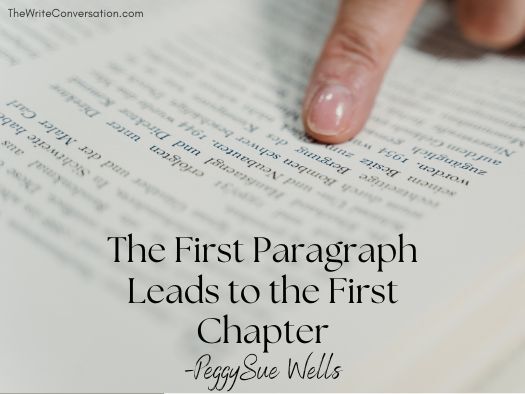
by PeggySue Wells @PeggySueWells
Take a look at your manuscript. Does your first line compel the reader to take in the first paragraph? Is the opening paragraph an incentive to read the first chapter?
RememberYour first line prompts the reader to read the first paragraph.The first paragraph compels the reader to read the first chapter.The first chapter invites the reader to finish the book.The last chapter sells your next book.
I cringe when writers show me their work and they have written to the reader, “Don’t stop reading, you’ll see why later.” Or, “Stay with me, it will be worth it.” Or, “Keep turning pages to find out …”
An author’s first job is to elicit emotion in the reader. We create work that a reader feels is worth an investment of their time and money. Rather than ask the reader to hang on until they have a reason to keep reading, move to the beginning the parts that compel them to turn pages.
Like us, readers come to a piece of writing with several questions.What’s in this for me?Why should I care?Is this believable?Can I trust this author will deliver a story as good as promised?
With an interesting first sentence in place, pen an opening paragraph that stirs curiosity in the reader to discover what is to come. What questions does the first paragraph ask in these first paragraphs? Would you keep reading?In the beginning God created the heaven and the earth. And the earth was without form, and void; and darkness was upon the face of the deep. And the Spirit of God moved upon the face of the waters. ~ The BibleNikki, the name we finally gave my younger daughter, is not an abbreviation; it was a compromise I reached with her father. For paradoxically it was he who wanted to give her a Japanese name and I—perhaps out of some selfish desire not to be reminded of the past—insisted on an English one. ~ A Pale View of Hills by Kazuo IshiguroThis was an extraordinary mission. No presidential aides had ever done what they were about to do. J. Fred Buzhardt and Leonard Garment settled into their first-class seats on Eastern flight 177 from Washington D.C. to Miami. They had reached an inescapable conclusion and had reviewed the reasons over and over. Garment had a list on a yellow legal pad–now twenty-two or twenty-three items. It was a bleak and very unpleasant business. ~ The Final Days by Bob Woodward and Carl BernsteinLittle Ruth felt herself being shaken. She opened an eye. Six-year-old June leaned over her, the sleeves of her red robe dragging against Ruth’s quilt. “Get up! Santa’s been here!” ~ The Sisters of Summit Avenue by Lynn CullenI watched the headlights bounce up and down our long, bumpy driveway. They took forever to arrive, but only because I was so excited. ~ The Mysterious Matt Barnes by Matthew Weigelt Anything could happen while the dead slept. Which was why some would say a woman shouldn’t tread alone through a cemetery at 2:55 on a Tuesday morning in April. But possible danger had never stopped Houston FBI Special Agent Tori Templeton, especially when her mind marched with determination. Her body refused to give in to rest, but it wasn’t a violent crime robber her of sleep. ~ Deep Extraction by DiAnn MillsAs the graveyard fell dark into the shiver of the canyon’s breath, the sexton, with the arduous motion of arthritic hands, donned his coat, hat, scarf, lit the wick of a candle-lantern, then emerged from his cottage into the snow-draped graveyard to chain the cemetery’s gates against threat of grave robbers.~ The Letter by Richard Paul Evans
Once a piece is complete, many authors return to the first paragraph. When a project is finished, the writer has learned more about their story and can polish the opening paragraph to elicit emotion in the reader.
Does your first line compel the reader to continue through the first paragraph? Does the first paragraph lead the reader to invest time in the first chapter? Will the first chapter propel the reader to complete the book? Will the reader close this book and immediately look for the next by the same author?
TWEETABLEThe First Paragraph Leads to the First Chapter from @PeggySueWells on @EdieMelson (Click to Tweet)
 PeggySue Wells is the bestselling author of 40 books and collaborator of many more. Action and adventure, romantic suspense, military romance, and cozy mystery are the page-turning novels by P.S. Wells, including Homeless for the Holidays, Chasing Sunrise, The Patent, and Unnatural Cause. How to live better, easier, and simpler is the focus of her nonfiction including The Ten Best Decisions A Single Mom Can Make. Founder of SingleMomCircle.com, PeggySue coaches writing and speaks at events and conferences. When not writing, she parasails, skydives, snorkels, scuba dives, rides horses, and has taken (but not passed) pilot training. Connect with her at www.PeggySueWells.com, on Facebook at PeggySue Wells, and LinkedIn at linkedin.com/in/peggysuewells
PeggySue Wells is the bestselling author of 40 books and collaborator of many more. Action and adventure, romantic suspense, military romance, and cozy mystery are the page-turning novels by P.S. Wells, including Homeless for the Holidays, Chasing Sunrise, The Patent, and Unnatural Cause. How to live better, easier, and simpler is the focus of her nonfiction including The Ten Best Decisions A Single Mom Can Make. Founder of SingleMomCircle.com, PeggySue coaches writing and speaks at events and conferences. When not writing, she parasails, skydives, snorkels, scuba dives, rides horses, and has taken (but not passed) pilot training. Connect with her at www.PeggySueWells.com, on Facebook at PeggySue Wells, and LinkedIn at linkedin.com/in/peggysuewells
Published on February 03, 2025 22:00
February 2, 2025
Are You Still Writing?
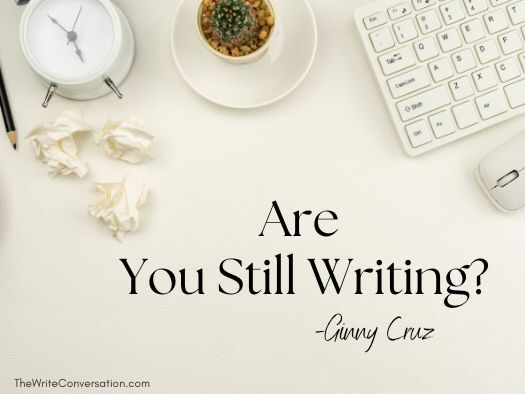
by Ginny Cruz, MPA, PT
Recently, a friend asked me that question. Since I signed a book contract a few years ago, friends and associates have wondered when the book will be in stores. The publication has been pushed to a future date twice, so it is normal for folks to wonder what I am doing in the meantime. Hence, the question, “Are you still writing?”
Writers write—it is what we do. We pen books, articles, devotions, or shopping lists on paper. Words are our superpower, and we love spending time with them. But I must admit, my friend's question made me pause and reflect on my writing journey. If you feel sluggish, unnoticed, or even depressed about how your writing is going, take out a pen and some paper and answer the following questions.
3 Questions for the Discouraged Writer
1. Why Do I Write?
When I began my writing journey, I thought, "If only one person benefits from my work, I will be satisfied." Has that thought crossed your mind? After many years spent improving my craft, seeking publication opportunities, entering writing contests, and hobnobbing with successful writers, I can honestly say, "That sentiment is no longer true. I need more than one person to appreciate my work for me to continue."
Understanding why you write can motivate you when you feel unnoticed or underappreciated. If you write for one person, then one person it is. That may well be what God intends. But God may want you to work harder to reach more people. If you want a larger audience, caring enough for their needs should motivate you to write the words they love to read.
2. Would I Write Even If No One Cared?
I would write a daily journal, pen my travel diaries, or assemble an ancestry book for my family. But would I sit for hours writing content to elevate my social media exposure? Would I meet deadlines month after month to produce a blog few read? While I have done these things for years, my goals are more extensive than creating a personal diary. My primary goal moved from writing to please my creative urges to securing a traditional publishing contract. Therefore, I would not continue with the same fervor I have maintained for nearly a decade without the goal of creating a larger audience of readers.
As a Christian writer, my primary audience is God. He called me to write, and I know He cares that I use my talent. While I write to please Him—the only one who matters—it became clear along my journey that He had bigger plans than I had imagined. To reach more people, building an audience for a book has become what I believe He desires.
3. Would I Feel Successful As A Writer If I Was Never Traditionally Published?
No, I would not. Self-publishing is relatively easy in today’s digital world. I have self-published three books and discovered firsthand that publishing is easier than finding buyers. Again, my goal, and I believe God’s desire, is a larger audience. So, I have worked tirelessly to get traditionally published, gain more fans, and hopefully win a few awards because awards sell books. Am I proud to admit that my desire is no longer to help only one but many? No, not really. It sounds more noble to do all this work to only help one. But I find it keeps me motivated when I admit the truth. God has convinced me that He wants my writing to reach more than one person. And that knowledge keeps me motivated.
Much work often goes unnoticed for a long time in this business. Yet, the writer who knows the real reason he writes has a better chance of continuing to put words down on paper. You know you must when the One who called you to write nudges you to reach more people.
If you feel blue about your writing, maybe it is time to ask yourself some probing, possibly difficult questions. Knowing your answers will help you maintain forward momentum when the world does not notice or appreciate all your labor.
What motivates you to write when you feel discouraged?
TWEETABLEAre You Still Writing? from author Ginny Cruz on @EdieMelson (Click to Tweet)
 Ginny Cruz, MPA, PT is a pediatric physical therapist, early intervention specialist, and award-winning author. Her writing encourages and teaches moms simple and effective ways to help their baby meet developmental milestones. In addition to writing, she enjoys hiking, reading, and camping with her husband. Find out more at ginnycruz.com, Instagram, or Facebook.
Ginny Cruz, MPA, PT is a pediatric physical therapist, early intervention specialist, and award-winning author. Her writing encourages and teaches moms simple and effective ways to help their baby meet developmental milestones. In addition to writing, she enjoys hiking, reading, and camping with her husband. Find out more at ginnycruz.com, Instagram, or Facebook.
Published on February 02, 2025 22:00
February 1, 2025
Spiritual Practices for Writers: The Practice of Trusting
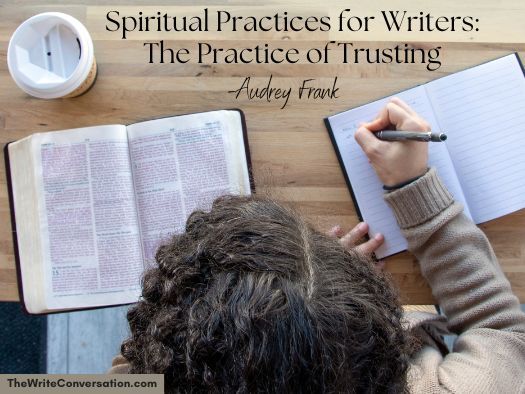
by Audrey Frank @AudreyCFrank
Join me the first Sunday of each month this year as we examine twelve spiritual practices for writers.
Trust in the Lord with all your heart, lead not on your own understanding. In all your ways acknowledge him and he will make your paths straight (Proverbs 3:5-6).
There is a kind of prayer called a prayer of intention. It is the practice of presenting oneself to the Lord and setting one’s intention toward Him in a specific way each day. The prayer of intention helps us practice trusting God on the writing journey.
Paying attention to what we think of first thing in the morning can reveal our heart’s natural intention. The thoughts that greet us upon waking can be the most honest thoughts we have all day. They tell us the truth about what we treasure most.
Am I even a writer at all?
Treasure: I want to be a writer, Lord.
I have to get at least 5000 words written today!
Treasure: My own strength.
I am a failure. That book is sitting there unfinished.
Treasure: My worth is in my ability to finish a book.
The truth about the global best-selling author and the unknown writer of unfinished books is the same:
God is our author and finisher .
His strength is made perfect in our weakness.
Our value originates from the fact we are loved by God.
What the heart treasures drives intention. If I treasure my own strength, I will exhaust myself trying to accomplish. If I treasure the book I am trying to finish, I will use that same treasure to berate myself during a season of illness or trial when I am unable to write every day. What these natural treasures have in common is trust in me, not God.
It’s not wrong to want to be a writer, to set daily word-count goals, and to finish a book. But for the Christian writer, these goals must all lead us to the ultimate goal: glorifying God. There is so much more joy in being His writer, producing words in His strength, and finishing a book He asked me to write.
I don’t know about you, but my good goals often become idols and I find myself bowing to them instead of God. They are cruel masters. The Lord is, however, kind.
The good news is that we can wrangle those unruly intentions and redirect them. When we practice trusting God each morning, our treasures are transformed.
Romans 12 invites us to present ourselves to God with intention.
Therefore I exhort you, brothers and sisters, by the mercies of God, to present your bodies as a sacrifice—alive, holy, and pleasing to God —which is your reasonable service. Do not be conformed to this present world, but be transformed by the renewing of your mind, so that you may test and approve what is the will of God—what is good and well-pleasing and perfect (Romans 12:1-2).
When we first come to wakefulness in the morning, we can respond to our clamoring treasure-thoughts by presenting them to God:
Lord, I present myself to You today. I set my intention to trust You with who I am. I intend to rely on Your strength to write. I accept what I am able to do in Your strength today. Amen.
All through the day, as I think, write, and do with intention, I am at peace. I trust God, and my intentions follow. At the end of the day, I rest with the satisfaction that I worked with Him this day according to His will, and it was good. Tomorrow, I will do it again.
One day we will worship in heaven with Amy Carmichael, C. S. Lewis, and the many other great Christian writers who practiced trusting God. Together we will see clearly who we are, the impact of every word we wrote, and all will be finally finished.
How has the practice of trusting God transformed your writing? Join the conversation!
TWEETABLESpiritual Practices for Writers: The Practice of Trusting from @AudreyCFrank on @EdieMelson (Click to Tweet)
Don't Miss The Previous Spiritual Practices for Writers! January: The Practice of Planning February: The Practice of Trusting
 Audrey Frank is an author, speaker, and storyteller. The stories she shares are brave and true. They give voice to those whose words are silenced by shame, the hard things in life that don’t make sense, and the losses that leave us wondering if we will survive. Audrey and her family have spent over twenty years living and working among different cultures and world views, and she has found that God’s story of redemption spans every geography and culture. He is the God of Instead, giving honor instead of shame, gladness instead of mourning, hope instead of despair. Although she has three different degrees in communication and intercultural studies, Audrey’s greatest credential is that she is known and loved by the One who made her.
Audrey Frank is an author, speaker, and storyteller. The stories she shares are brave and true. They give voice to those whose words are silenced by shame, the hard things in life that don’t make sense, and the losses that leave us wondering if we will survive. Audrey and her family have spent over twenty years living and working among different cultures and world views, and she has found that God’s story of redemption spans every geography and culture. He is the God of Instead, giving honor instead of shame, gladness instead of mourning, hope instead of despair. Although she has three different degrees in communication and intercultural studies, Audrey’s greatest credential is that she is known and loved by the One who made her.Audrey is the author of Covered Glory: The Face of Honor and Shame in the Muslim World (Harvest House Publishers), an outpouring of Audrey’s heart to introduce others to the God of Instead. Shame is not unique to the developing world, the plight of the women behind veils, young girls trafficked across borders; shame is lurking in hearts everywhere. Through powerful stories from women around the world, Covered Glory illuminates the power of the Gospel to remove shame, giving honor instead. Available at favorite booksellers: BARNES & NOBLE, BOOKS A MILLION, AMAZON.
Published on February 01, 2025 22:00
January 31, 2025
A Writer’s Journey Through the Jungle of Social Media
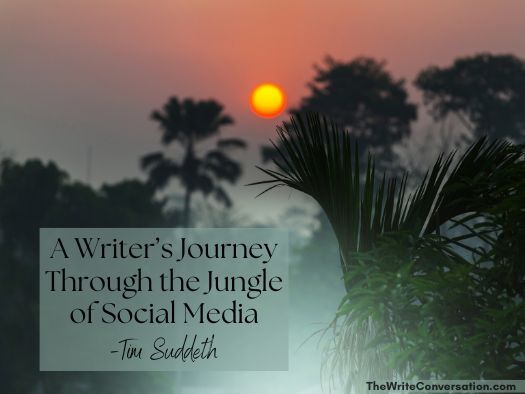
by Tim Suddeth @TimSuddeth
We have some smart people on this blog. Many are on top of social media and all of its recent changes. Others are having successful success at building platforms with beaucoup followers to promote their writing and teaching.
I’m not one of them.
Social media, technology, building platforms—they’re a jungle to me. Robert Frost wrote about two roads diverging in a yellow wood. This is more like the Atlanta highway system. Or a bowl of tangled spaghetti.
One problem with social media is it continues to change even as we speak. Companies come and go. Sometimes merge. We watch the users come and go. Not to mention the ever-changing algorithm alligators. When you’re in the jungle, you only see a part of the path among the trees. Is it headed where you think it goes?
I would love to share with you my carefully developed plan for using social media to build a huge platform—if I only had one. Instead, let me tell you how I’m using social media while hoping to remain sane.
How to Use Social Media and Keep Your Sanity
1. Don’t try to do everything.
It often seems like everyone else has their favorite social media sites. Often at a writers’ group or online forum, you’ll hear several people preaching that they are using the BEST platform, and that you should be using it, too. Because there are so many sites out there, it’s impossible to keep a meaningful presence on all of them. I googled the newest platforms and got a list of ten sites I’ve never heard of. (Go ahead and do that. I’ll bet your list will already differ from mine.)
You can’t, and you shouldn’t, learn every one of them.
2. Find your niche.
Instead of jumping on all of them, find the ones that fit you. On this blog, we have folks with a variety of goals. We have writers, teachers, podcasters, researchers, missionaries, grandparents. Each of whom could be best fitted for different platforms. Ask yourself these questions.Where does your audience go?What are your strengths in presentation?Which platforms do you enjoy doing?
As for me, I don’t see myself doing a podcast. I may do one or be someone’s guest. But to commit to showing my face and speaking regularly would be a big stretch for me.
Keeping a regular presence on a site takes a lot of time, energy, and commitment. Find something you are comfortable with and interested in.
3. Don’t be afraid to try new things, and to let them go.
I say this with a lot of hesitation. First, what you put on the internet, stays on the internet. No, it’s not like staying in Vegas. Instead, someone will be able to see it years after you’ve moved on. You want to put your best work out there and not put anything that might embarrass you or someone else. Be aware of the image you’re presenting.
Second, followers don’t like to be jerked around. If you have built up followers posting pictures of your Pomeranian riding in a ‘57 Chevy, you don’t want to suddenly switch to giving recipes for Korean kimchi. Be consistently different. If you love your pup and Asian foods, you might need to have to separate sites. Just keep meeting your followers’ expectations.
Recently, I opened an account on Instagram. Some friends who are doing well on it, so I gave it a shot. But it wasn’t for me. I’m not much of a visual learner. Instead, i learn from reading and doing. So, I haven’t been on it lately.
Could I have been successful on it? Maybe I was. At a conference I attended, one of the authors came over to me and said he was glad to see me on Instagram. Hmm. That made me rethink my decision. You never know who may be watching.
4. Don’t chase the numbers.
It is so easy to chase the numbers. I mean, the more followers you have, the more successful you are. Right? Wrong.
Instead of chasing numbers, chase your audience. Who do you want to relate to? What do you want to tell or show them? Some of us want to entertain, to encourage, to instruct. What do you have that someone would like to read or listen to? How can you present it most effectively? And how can you share it in a way that is uniquely you?
James Scott Bell, over on the Kill Zone Blog, wrote that we need to get away from ‘discoverablity thinking’ and get into ‘trustablility thinking’. Instead of trying to pile up followers, you should look for opportunities “to prove to readers that you deliver the goods. As you do this, time after time, trust in you grows. Consumers buy more from businesses they trust. Readers are consumers and you are a business.”
5. Remember your why.
Whether you are a new writer, a writer new to being published, or a seasoned writer who is learning that the jungle is constantly changing. it’s important to remember why you started writing. Why you’re on the social media you’ve chosen. Are you getting your message out to the audience who needs it?
6. Enjoy the journey.
Eva Marie Everson, in her post “Dipping the Quill Deeper: Returning to Your Olive Trees” here on The Write Conversation, wrote about a man who left a job to work a field of olive trees. By doing what he felt God had called him to do, he was able to leave the chaos of his job and find simplicity, quiet, and peace within his work.
“When I’m [Eva] asked, as a now-professional, what advice I would give to new writers (or to myself as a new writer), I always answer, ‘Enjoy the beginning. Enjoy the process.’”
Even in a jungle, there are beautiful sights to see and examples of God’s awesome handiwork. And as Christians, we do not travel this path alone.
Remember, this is supposed to be fun. Hard work, yes. But still fun. We are able to do what many can’t. And that God has gifted us to do this is truly a special blessing.
TWEETABLEA Writer’s Journey Through the Jungle of Social Media from @TimSuddeth on @EdieMelson (Click to Tweet)
 Tim Suddeth is a stay-at-home dad and butler for his wonderful, adult son with autism. He has written numerous blogs posts, short stories, and three novels waiting for publication. He is a frequent attendee at writers conferences, including the Blue Ridge Mountain Christian Writers Conference and a member of Word Weavers and ACFW. He lives near Greenville, SC where he shares a house with a bossy Shorky and three too-curious Persians. You can find him on Facebook and Twitter, as well as at www.timingreenville.com and www.openingamystery.com.
Tim Suddeth is a stay-at-home dad and butler for his wonderful, adult son with autism. He has written numerous blogs posts, short stories, and three novels waiting for publication. He is a frequent attendee at writers conferences, including the Blue Ridge Mountain Christian Writers Conference and a member of Word Weavers and ACFW. He lives near Greenville, SC where he shares a house with a bossy Shorky and three too-curious Persians. You can find him on Facebook and Twitter, as well as at www.timingreenville.com and www.openingamystery.com.
Published on January 31, 2025 22:00
January 30, 2025
Learn How to Borrow From Other Writers Ethically

by Edie Melson @EdieMelson
This is an issue that’s come up a lot lately in my communities. The borrowing I’m referring to is in reference to anything that’s written or taught. The teaching could be in person, online, or at a conference.
We all want to be generous, but we also want to be respectful of the work others have put into the things they share. So here’s my list of things we might borrow and how we need to handle the borrowing ethically.
10 Ways a Writer Can and CANNOT Borrow Ethically
1. A blog post. If we wish to share a blog post, we can post the link online or in written material without ever asking. It’s a good thing to share what someone else has written this way.
However, we should never copy and re-paste or reprint a blog post that someone else has written without express permission FIRST.
2. An article. Same rules and etiquette apply with articles as with blog posts.
3. An email. Emails are also written. And technically, according to copyright law, an email copyright belongs to the person who wrote it. So for example, let’s say a writer wants to ask for endorsements. That person may assume it’s fine to take someone else’s endorsement request email and copy it and use it for themselves. Although this practice is done fairly often, it really is not ok.
The way to handle this situation is to first email the person whose email we wish to copy and ask permission. It’s the respectful thing to do.
4. A form. Published writers spend a surprising amount of time composing forms. We have forms to engage launch team members, forms to join groups, even forms to use when we’re assessing coaching someone. All of these forms took work to create. Again, it is not okay just to copy a form and use it for ourselves without asking.
5. A handout. Many of us teach writing as well as write. And to do that well, we create handouts. Those handouts are meant to help our students. They are not something we create to be distributed by those students to people who didn’t take the class.
6. A presentation slide. I will frequently take a quick picture of a slide when I’m sitting in a class. I do this because it helps me retain the information that’s being taught. I have students who do the same thing. It is never acceptable to share those images with someone who wasn’t in the class without permission.
7. A quote. Quotes are funny things right now. There hasn’t been a legal case go through our system to find out what the law says about using quotes. However, it is always good etiquette to ask if you can quote someone.
8. A social media post. On social media we have the option to share or retweet or repost something. All of those things are fine to do without asking permission. The reason this is fine is because sharing that way leaves the name of the original poster in place.
What is not okay is copying a post or a picture or a meme and creating a new post. That is borrowing and before we do that, we need to ask permission.
9. A meme. A meme is a picture with text embedded. These are frequently seen on social media, but can also be seen in newsletters and on websites. Again, this is something that took time to create and we need to respect the work and the ownership and ask permission before we download the meme and share it somewhere else.
There are two exceptions to this: First, if someone gives permission to use that meme in the text referring to it. Then we don’t have to ask permission because we’ve already received permission.Second, if the meme is the featured image of a blog post and when you share the URL of the post the image doesn’t come up, you may manually insert the image.
10. A book (or excerpt from a book). Most people know you shouldn’t reprint a book. But it’s also important to ask permission before borrowing a good-sized chunk of the book, or even a small-size chunk. Even if what you’re borrowing isn’t a copyright infringement, it’s still proper etiquette to ask first.
These are the things I came up with that a writer might be inclined to borrow. What would you add to the list? Be sure to leave your thoughts about “borrowing” in the comments section below!
Don’t forget to join the conversationBlessings,Edie
TWEETABLE Learn How to Borrow From Other Writers Ethically from @EdieMelson (Click to Tweet)
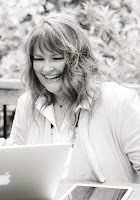 Edie Melson is a woman of faith with ink-stained fingers observing life through the lens of her camera. No matter whether she’s talking to writers, entrepreneurs, or readers, her first advice is always “Find your voice, live your story.” As an author, blogger, and speaker she’s encouraged and challenged audiences across the country and around the world. Her numerous books reflect her passion to help others develop the strength of their God-given gifts and apply them to their lives.Connect with her on her website, through Facebook, Twitter and on Instagram.
Edie Melson is a woman of faith with ink-stained fingers observing life through the lens of her camera. No matter whether she’s talking to writers, entrepreneurs, or readers, her first advice is always “Find your voice, live your story.” As an author, blogger, and speaker she’s encouraged and challenged audiences across the country and around the world. Her numerous books reflect her passion to help others develop the strength of their God-given gifts and apply them to their lives.Connect with her on her website, through Facebook, Twitter and on Instagram.
Published on January 30, 2025 22:00
January 29, 2025
Sometimes Delays in Our Writing Dreams Lead to Stunning Results

by Edie Melson @EdieMelson
Now to him who is able to do far more abundantly than all that we ask or think, according to the power at work within us, to him be glory in the church and in Christ Jesus throughout all generations, forever and ever. Amen. (Ephesians 3:20 - 21 ESV)
I was in Florida for the FLORIDA CHRISTIAN WRITER'S CONFERENCE several years ago. One of my favorite things—outside of all the writing related-blessings—is getting up to take sunrise pictures. I'm never alone for sunrise, there are always a good-sized group of us who enjoy starting the day this way.
On this particular morning there was a big cloud bank, just above the horizon, blocking the area where the sun would come up. We hoped there would be pretty sun rays even though we wouldn't be able to see the sun come up--or maybe even some beautiful colors in the clouds.
But as the clocked showed us astronomical sunrise, the sky remained bland. Many of our group drifted away to breakfast, unwilling to wait and see if there would be any beautiful pictures when the sun finally made it past the wall of clouds.
As I waited, still hopeful, my thoughts turned to my own publishing journey. So many times during the years it seemed like my writing was destined to remain hidden. My own publishing timeline was delayed well beyond what other writers experienced. But I remained hopeful, certain that God had called me to write. Some of the others who faced delays gave up.
Standing on the dock, I began to see the sky lighten behind the clouds. The sun was about to make its entrance. Sure enough, as you can see from the image above, the sunrise didn't disappoint, it was spectacular.
The same thing happened with my publishing journey. My path didn't look like I expected, and the time-frame wasn't what I would have chosen. But the outcome has been so far beyond what I hoped and dreamed, words to describe it fail me.
So my encouragement is for you today is three-fold:First, stay faithful. God has a plan. Second, you did not misunderstand His call. Third, get ready for God to blow you away with His blessings. I know it's easy to get discouraged while waiting for your writing dreams to blossom, but it's work the wait!
TWEETABLESometimes Delays in Our #Writing Dreams Lead to Stunning Results from @EdieMelson (Click to Tweet)
 Edie Melson is a woman of faith with ink-stained fingers observing life through the lens of her camera. No matter whether she’s talking to writers, entrepreneurs, or readers, her first advice is always “Find your voice, live your story.” As an author, blogger, and speaker she’s encouraged and challenged audiences across the country and around the world. Her numerous books reflect her passion to help others develop the strength of their God-given gifts and apply them to their lives.Connect with her on her website, through Facebook, Twitter and on Instagram.
Edie Melson is a woman of faith with ink-stained fingers observing life through the lens of her camera. No matter whether she’s talking to writers, entrepreneurs, or readers, her first advice is always “Find your voice, live your story.” As an author, blogger, and speaker she’s encouraged and challenged audiences across the country and around the world. Her numerous books reflect her passion to help others develop the strength of their God-given gifts and apply them to their lives.Connect with her on her website, through Facebook, Twitter and on Instagram.
Published on January 29, 2025 22:00
January 28, 2025
When You Don't Feel Like Writing Use These 6 Ways to Get Started

by Lynette Eason @LYNETTEEASON
What do you do when you don’t feel like writing? Gasp! Not feel like writing? Is that even a real feeling?
Um…yes. Unfortunately, it happens. At least to me. Don’t get me wrong. I love what I do. I adore my job and the flexibility it affords me. Believe me, I don’t take it for granted. But I don’t wake up EVERY SINGLE day thinking, “Oh boy! I’m just so excited, I can’t wait to hit the keyboard!”
For those of you who do this, we are not friends and you can go away.
Just kidding.
Sort of.
Anyway, for those of you who are occasionally afflicted with this “I don’t want to write today” thing, I have a few helpful tips on how to get past that.
6 Things to do When You Don't Feel Like Writing
Sit down in front of your manuscript and edit. Sometimes when I edit, I’ll get a new idea to flesh out. That will generate some excitement about moving forward with the story.Get your voice recorder out and start brainstorming the next part of the story. Just start talking. It’s okay if you sound like an idiot, you’re the only one who will hear it.Do something physical. But read the last part of your manuscript before you go. Then while you’re working out or walking around the block, you can be thinking about the next scene, fleshing it out in your mind, getting it ready to be put on the screen.Email a brainstorming buddy and cry on his or her shoulder tell her the story in a stream of consciousness telling. Don’t stop to breathe, just talk. When you’re finished, say, “Now what happens?"Sit down in front of your manuscript and tell yourself you can’t get up until you write at 10 words. Yes. 10. Then you’re allowed to go do something fun. Because I can’t write just 10 words. I always write more. Granted, sometimes it’s 20, but at least I met my goal! Ha. Seriously, I’m willing to bet that would happen to you too.And last but not least, adopt the Nike slogan. “Just do it.” (Most necessary when deadlines loom.)
Yes, I know you think that that last one is not really the most helpful suggestion, but actually it is. I look at it this way. Everyone who has a job has days where he/she doesn’t want to go in to work. Writing is the same thing. It’s your job. Unless you’re sick or otherwise incapacitated, you go to work. Although I will say this, like some dedicated people (who are unappreciated in the office environment) sometimes you go to work when you’re sick. The good thing is that, at least if you’re a writer and you work from home, you won’t spread the yuck.
Honestly, I really do love writing. I’m very excited about each project God lets me work on. Like I said earlier, I don’t take it for granted that I get to do what I get to do. I’m not whining or complaining. I’m just being honest. Some days it’s just plain hard work and some days I’m just not in the mood to go to work. And that’s okay.
And I would like to also point out that these suggestions are great for pre-pubbed writers as well. You may not have publisher deadlines, but if you don’t get a manuscript finished…you won’t have publisher deadlines.
So, what are some other suggestions you could add to the list? What do you do when you MUST write and you just don’t want to? I can ALWAYS use more ideas!
TWEETABLEWhen You Don't Feel Like Writing Use These 6 Ways to Get Started @LynetteEason on @EdieMelson (Click to Tweet)
 Lynette Eason is the best-selling, award-winning author of over sixty-five books. Many have appeared on the USA Today, Publisher’s Weekly, CBA, ECPA, and Parable bestseller lists. Lynette teaches at writing conferences all over the country, but when she's not plotting and writing her next story, she’s hard at work as an agent for the Steve Laube Agency.
Lynette Eason is the best-selling, award-winning author of over sixty-five books. Many have appeared on the USA Today, Publisher’s Weekly, CBA, ECPA, and Parable bestseller lists. Lynette teaches at writing conferences all over the country, but when she's not plotting and writing her next story, she’s hard at work as an agent for the Steve Laube Agency. Lynette is looking to represent a wide variety of fiction including, but not limited to, romantic suspense, thrillers, mysteries, speculative fiction, historical, women’s contemporary, YA, and writers targeting the Love Inspired suspense lines. I’m also interested in YA non-fiction and may be interested in some adult non-fiction, depending on the topic. For fun, Lynette enjoys hanging out with her family and putting her photography skills to good use. You can find more about Lynette at www.lynetteeason.com and www.stevelaubeagency.com
Published on January 28, 2025 22:00
January 27, 2025
Dipping the Quill Deeper: Returning to Your Olive Trees
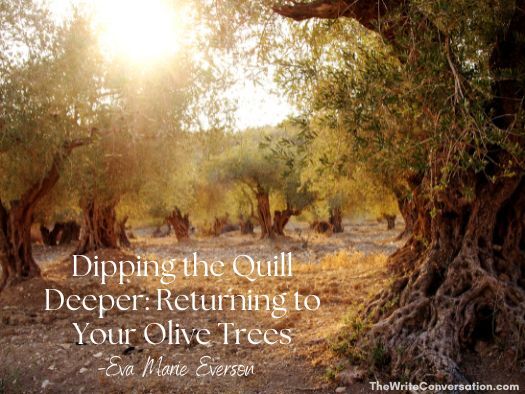
by Eva Marie Everson @EversonAuthor
I met Miriam Feinberg Vamosh in 2002 when, as a journalist, I went to Israel for the first time. Miriam is a renowned author and tour guide, as well as an expert in archeology and heritage. Within my ten days there, she became my dear friend.
In 2006, Miriam and I were contracted by Thomas Nelson to write a type of tour book/coffee table book on Israel—two women—one Jewish, one Christian—“walking” the land together. The book, Reflections of God’s Holy Land, which was a blessing to research and write, earned an ECPA silver medallion as well as several other awards.
Then, in 2009, Miriam and I organized and led another group of journalists, making this my third trip to the Holy Land. After ten days, she and I said goodbye to those who’d come from the US with me, then drove to Nazareth where we spent the night at The Fauzi Azar, a 19th century mansion-turned-guesthouse built from stone and boasting hand-painted ceilings, marble floors, and limestone arches.
The following morning, after a delicious breakfast, Miriam and I set out on The Jesus Trail, a 40+-mile hiking trail in the Galilee that brings walkers of all ages and stages to important sites from the life of Jesus, along with a few other historical and religious sites. The trail begins in Nazareth then winds its way through the Galilee region, ending in Capernaum. Along the way, the trail is marked by painted rocks. The direction of the painted lines indicates which way to go—straight ahead, to the left, to the right.
We were about midway through the day when we passed through an expansive olive grove, thick with trees, their silvery-green leaves shimmering in the sunlight. There, just off the pebbled and sandy path, a man stood beneath the branches of one of the trees where a large white sheet had been stretched around the trunk. The man held a long stick in his hand with which he beat the branches. All around him, dark green olives fell to the sheet.
“Shalom,” Miriam called out.
“Shalom shalom,” he returned.
Miriam then asked him something in Hebrew and he replied, “Lo, lo.” (No, no.) And then he said a few lines more. Miriam turned to me. “He doesn’t speak English,” she said, “but he wants to tell us his story.”
For the next few minutes, I listened as these two Hebrew-speaking Israelis talked—mostly him with Miriam giving an occasional, “Ah.” Then Miriam turned and shared his story. It went something like this: This is my olive grove. I worked it for many years until I decided to start a new business. I owned mules that took tourists and locals from the base of Mount Arbel to the top and then back down again. I did this for a long time, all day, every day. Then one day I realized I was tired. Too many people. Too much work. Too many hours. So I closed down my service and returned to my olives.
I wanted to cry. This man, small and weathered, understood simplicity. Quiet. Peace. Doing what God called him to do rather than what a dollar bill enticed him to do. And within that simplicity and quiet and peace . . . was work. But is it work when you love it? Is it work when “these are my olives”?
Just last week I was asked the question we writers both love and hate, a question that reminded me of the man in the olive grove: do you have a contract you’re working under?
My answer was, “No. I haven’t worked under contract for several years now.”
“But are you writing?”
“Absolutely. For the last few years, I’ve written on my own schedule, taking my time, working in the same way I did before I was offered my first contract.”
There’s freedom in that and this is something I think—no, I know—we cannot fully appreciate when we are in the pre-first-contract stage. We’re so anxious to finish, to pitch, to sign on the dotted line . . . and then, often (hopefully), the contracts start rolling in. Now I know that sounds great, but there’s more work involved than simply signing on the dotted line and turning over a finished manuscript.
When I’m asked, as a now-professional, what advice I would give to new writers (or to myself as a new writer), I always answer, “Enjoy the beginning. Enjoy the process.”
In other words, appreciate—and don’t forget—your time among the olives.
TWEETABLEDipping the Quill Deeper: Returning to Your Olive Trees from @Everson_Author on @EdieMelson (Click to Tweet)
 Eva Marie Everson is the CEO of Word Weavers International, the director of Florida Christian Writers Conference, and the contest director for the Blue Ridge Mountains Christian Writers Conference. She is the author of almost 50 books, both fiction and nonfiction. Her next novel, Beth Bettencourt, is set for release in 2026 (Kregel). To know more about Eva Marie (or to be added to her Southern newsletter), you can connect with her at www.EvaMarieEversonAuthor.com
Eva Marie Everson is the CEO of Word Weavers International, the director of Florida Christian Writers Conference, and the contest director for the Blue Ridge Mountains Christian Writers Conference. She is the author of almost 50 books, both fiction and nonfiction. Her next novel, Beth Bettencourt, is set for release in 2026 (Kregel). To know more about Eva Marie (or to be added to her Southern newsletter), you can connect with her at www.EvaMarieEversonAuthor.com
Published on January 27, 2025 22:00



